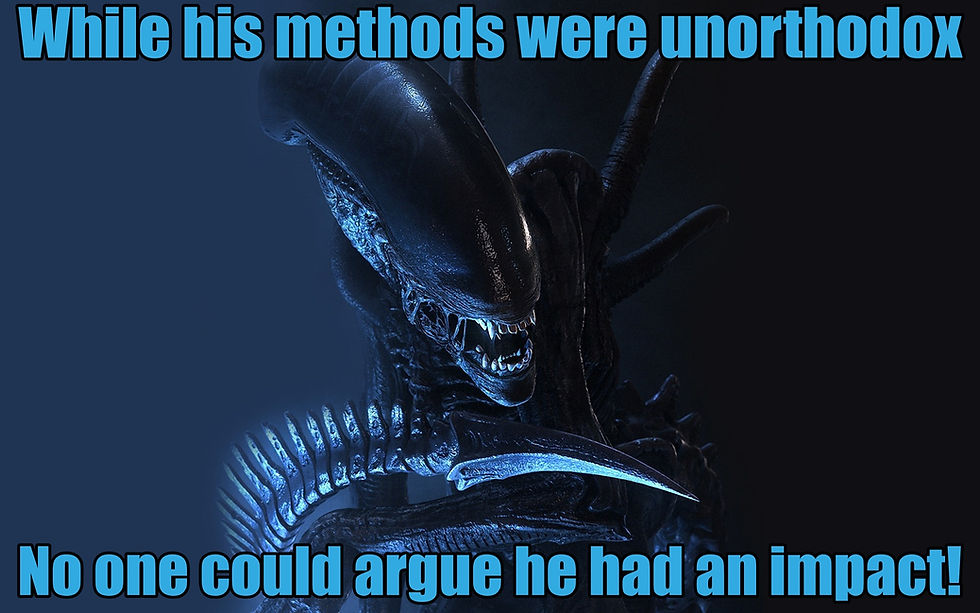Management Lessons from Movies, Chapter 3: Aliens
- Bill Holmes
- Jun 11, 2019
- 4 min read

"We all go a little mad sometimes." Norman Bates, Psycho
"Where you gonna go, where you gonna run, where you gonna hide? Nowhere... 'Cause there's no one like you left." Carol Malone, Body Snatchers
Aliens is an iconic movie and was the sequel to the groundbreaking and incredibly tense Alien. This movie established the alien as an iconic character and spawned a variety of sequels and prequels that attempted to expand beyond a typical “horror” movie by addressing interesting questions like the origins of the human species. My personal favorites were the series of “Alien vs. Predator” movies that were surprisingly entertaining while not conflicting with the broader tapestry of the Alien franchise.
Aliens begins with Ripley (Sigourney Weaver) asleep in a cryogenic sleep floating through space, having survived the initial encounter with the alien. We see a spacecraft approaching and she is rescued by a salvage vessel. She regains consciousness in a space facility circling earth, and finds out that 57 years have passed. A hearing is held to determine her role in the destruction of the Nostromo and she testifies that she blew up the ship to destroy the alien. She desperately tries to convince them how dangerous the alien is and that the remaining eggs should be destroyed. She is horrified to find out that the planet with the alien eggs has been inhabited for 30 years! We then see the colony on the planet and two employees reviewing orders to investigate an unsurveyed portion of the planet and wondering why they were asked to go to that particular location. They go, predictably the alien attacks and the colony stops communicating with earth.
Ripley is recruited to go on the rescue mission and finds herself on a massive warship accompanied by a group of tough and confident marines, a synthetic person and company representative, Carter Burke (Paul Riser). We also discover that the marine’s commander, Lt. Gorman (William Hope) hasn’t commanded in a battle before but is very confident in his training. The marines land and they find the main living area deserted, but as they sweep the area they find a young girl, Newt (Carrie Henn) who has survived by hiding in the ventilation system. The other colonists are located by using their personal trackers, and they are all clustered near the nuclear reactor that powers the colony. The marines descend into the alien hive and are quickly attacked, with only four surviving the initial encounter. Gorman panics and doesn’t know what to do, so Ripley steps up and drives the assault vehicle in and rescues the survivors. Once safe, they discover that the reactor was damaged in the battle and will explode in 4 hours. Over the objections of Burke, the military commander decides to retreat to orbit and destroy the planet.
What are some of the management lessons in the first part of Aliens?
The first lesson is that most management has a hard time understanding and synthesizing existential threats to their organization. In this instance, a highly trained pilot has an incredible story that is easily verified, yet rather than conduct a complete investigation they dismiss her as mentally unstable! Look at how the internet revolutionized retail, and how many “brick and mortar” stores have gone out of business by not adapting. Another example is the evolution of television from broadcast to cable, from cable to satellite and from satellite to streaming. Change is constant.
The next lesson is that it is never a good idea to withhold vital information from the front-line employees. The corporation had Ripley’s testimony and could have warned the colonists of what they were facing as the “surveyed” the area, but they withheld key information and the colonists were all killed. Information is not currency. Share it with people.
The third lesson is that training is not experience. Lt. Gorman is highly trained but not experienced. That lack of experience is why his solders weren’t properly equipped to fight the aliens and why he panicked when the marines were attacked. It is also why Ripley didn’t panic when the aliens attacked and why she was able to save the marines. Just because someone has a degree or went to a good school does not mean they are a good leader! Leaders are developed through experience.
The final lesson is that you should assess any information, regardless of the source. Newt was the only survivor of the colony and had done so by understanding the aliens movements and patterns. Yet she wasn’t even asked how she did so or what she knew! Data is everywhere, but actionable intelligence should be sought and used regardless of the source.
Next, I’ll finish Aliens.
Coda
As I type this the news is reporting on US Presidents Trump’s proposed tariff’s on Mexico. These tariffs are interesting because they are not being imposed for economic reasons, rather they are being used to pressure the Mexican government to take measures to stop the flow of illegal immigrants into the United States. I have no official position (though I do have a strong personal one) on this issue, but it fascinating to see the pundits react to the proposal. Their only response is the same old talking points from the past 20 years: Better economic conditions in Central America, better US laws, better border security, etc. Those are literally the same variables that have been in place for decades, and nothing has changed. Logic dictates that if you are presented with variables that are not favorable, then you disrupt the system by introducing new variables. In this case, tariffs. The tariff’s are nothing more than an attempt to disrupt the status quo and force new variables. Pundits, take note and get off your talking points!






Comments